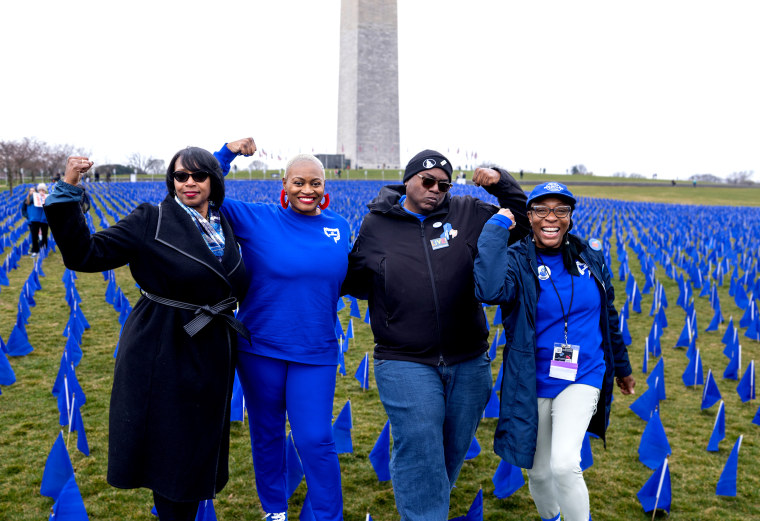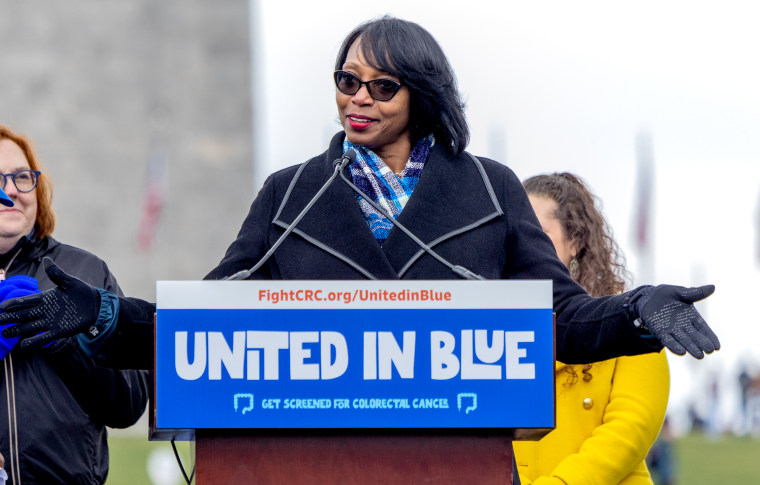In 2002, Candace Henley experienced shortness of breath and exhaustion after exercise. She didn’t think much of the symptoms but then developed severe constipation that lasted two weeks, and none of the over-the-counter treatments worked. After several trips to the emergency room, Henley finally learned what was wrong: She had stage 2 colon cancer.
“They found that there was blood in my stool,” Henley, 55, of Chicago, founder and CEO of colorectal cancer nonprofit The Blue Hat Foundation, tells TODAY.com. “Once they found the blood in my stool, they scheduled me for a colonoscopy, and the colonoscopy found a large tumor on the right side of my colon.”
She was diagnosed in 2003 at age 35. At the time, few people were talking about colon cancer in patients of any age. That motivated Henley to speak up about colon cancer.
“That started my advocacy,” she says. “It just didn’t make sense to me ... that I had cancer. (The doctors) were shocked as well because here I am, this 35-year-old, and I’m presenting with colon cancer.”

Path to a diagnosis
When Henley first started experiencing shortness of breath, she visited the emergency room. After an exam, the doctor thought that the mom of five was simply stressed.
Three weeks later, she fainted while boarding the bus she drove and experienced heart palpitations. She returned to the emergency room, where doctors worried she was having a heart attack. Tests revealed her heart was healthy, though, so doctors thought it was anxiety. But they did notice that she had a low blood count and recommended she follow up with her OB-GYN because of her history of fibroids and endometriosis.
“That was what they thought would be the answer to my issues,” Henley recalls. “It wasn’t.”
Her doctor performed a hysterectomy and gave her a blood transfusion, but she still struggled with constipation. About four months after her hysterectomy, she took a drink of water and began vomiting.
“I couldn’t stop, and my primary care doctor sent me to the emergency room,” she says. “They did a … test on my stool sample and found that there was blood in my stool.”
Her blood count had plummeted to such low levels that her doctor wondered how she was walking.
“They were saying, ‘You shouldn’t be able to be moving around like you are because you’re near organ failure,’” she recalls.
Henley felt confused by the doctors’ insistence that she was bleeding. She hadn’t noticed any blood.
“As far as I knew, I just couldn’t stop vomiting,” she says. “Once they found the blood in my stool, they scheduled me for a colonoscopy.”
That’s when doctors found a mass the size of a grapefruit, and she learned she had colon cancer.
“It wasn’t something that people talked about,” she says. “It was more of a shock to my family, as well.”
Doctors said Henley needed to undergo surgery to have her tumor removed. “I had no idea what to ask other than, ‘Can you fix me?’” she says.
Surgeons removed a “large portion” of her large intestine and reconnected it to her rectum.
She lost 50 pounds while she was in the hospital for 10 days, and when she left, her life changed dramatically. Because of lingering health problems, she could no longer work as a bus driver.
“I became homeless because I could not work,” Henley says. “No one would hire me.”
“I just wound up working whatever I could find,” she continues. “Life still goes on regardless of whether you have cancer. It does not stop. … You still have to pay bills.”

She felt absolutely alone. Her doctors considered her cured so she only had follow-up appointments. When she applied for social security disability, she only received form letters from her care team.
“I became invisible,” she says. “This feeling of not being acknowledged and not being seen and not being heard was the best way to describe it.”
In 2010, Henley got a stable job and was able to build back her life. She says she has lingering conditions from the cancer, including chronic obstructive pulmonary disease, chronic fatigue, brain fog and chronic back and joint pain. She also needs to be prepared when leaving the house.
“Everything that I do has to be thought out and planned out because there are moments where I have to know where a bathroom is,” she says. “There are times when I spontaneously have to go to the bathroom, and when I have to go, I have to go.”
Speaking out
Henley says she began sharing her story to raise awareness of increasing rates of young people with colorectal cancer. She advocates with Fight Colorectal Cancer, as well as her own nonprofit, and says she's been aware of the trend of colon cancer in more young people much longer than it's been in the news.
For example, she met a few other people around the time she was diagnosed who also developed colon cancer at 35 — all under the recommended screening age. “We were saying ... 20 years ago, ‘This is a problem,'" Henley adds.
As part of her advocacy, she wants more people to talk about their health history with their families and let people of color know that they can survive colon cancer.
“Family secrets kill families,” she says. “When we don’t talk about the diseases that run in our families, we run the risk of killing off our family lineage.”
“Anything that I read about minorities with colon cancer all say, ‘That this person died of colon cancer,’” Henley continues. “I want to change the narrative that we have to stop saying that someone is dying of colon cancer and show those of us that are living so that people know that surviving this disease is possible.”